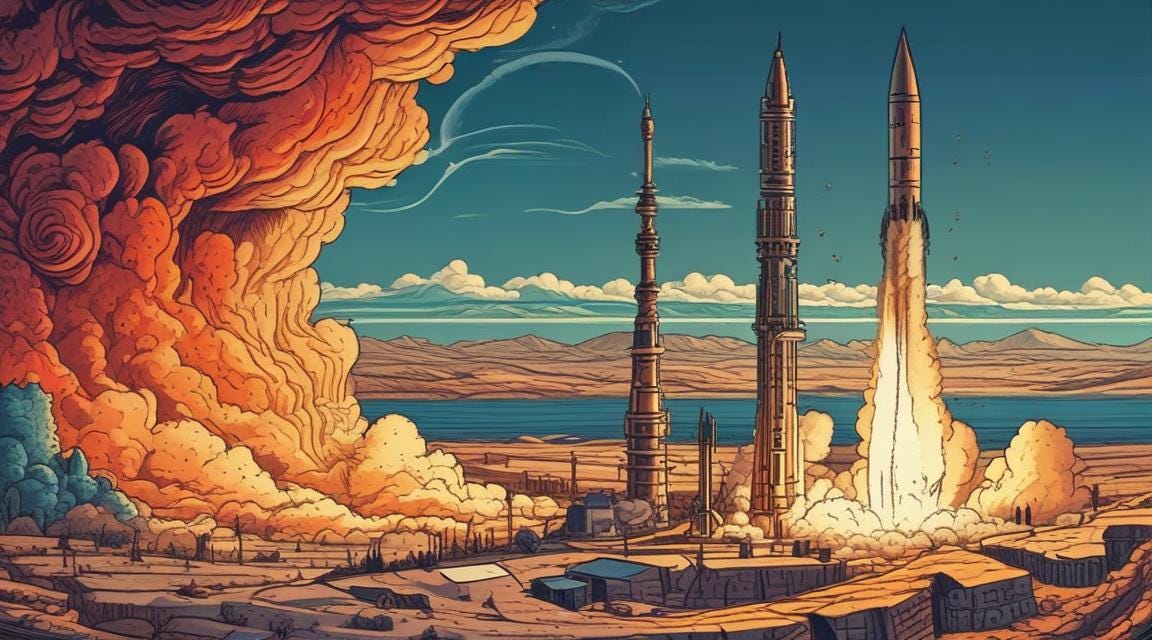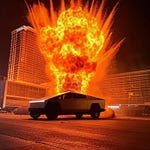Ah, the Middle East – where even the smallest spark can ignite a geopolitical wildfire. And in 2024, the flame is burning brighter than ever. The latest? Iran and Israel have locked horns yet again. But this isn’t your typical exchange of diplomatic shade or clandestine cyber-espionage. This time, the gloves are off, and ballistic missiles are doing the talking.
Iran has fired over 100 ballistic missiles towards Israel. The air-raid sirens are blaring, explosions are rocking Jerusalem, and people are scrambling to shelters – it’s a scene straight out of a dystopian thriller. But make no mistake, this is no movie. It's real life, and it’s messy.
What’s behind this escalation? How did we get here, and where is it all headed? Let’s break it down. Spoiler alert: it’s complicated.
The Chain Reaction: Iran’s Missiles and Israel’s Ground Invasion
On October 1st, 2024, Iran responded to Israeli military operations in southern Lebanon by launching a barrage of over 100 ballistic missiles. You read that right—over 100. This wasn't a few rogue rockets from a desert outpost; this was Iran flexing its military muscle, loud and clear.
But why? Well, it all goes back to Hezbollah, Israel's not-so-friendly neighborhood militant group stationed in Lebanon. The Israeli Defense Forces (IDF) had been busy engaging Hezbollah, conducting what they called "localized raids." Sounds clinical, doesn’t it? But make no mistake—these raids were anything but small-scale.
Israel’s ground invasion of southern Lebanon was essentially a message to Hezbollah: “We’re coming for you.” Over twenty locations in Lebanon were evacuated, and as the fighting intensified, Iran’s patience wore thin. Tehran wasn't going to sit idly by while its key ally was targeted. So, missiles flew, and the world watched.
The Nasrallah Factor: A Symbol of Resistance, a Target of Revenge
Much of the Israeli-Hezbollah conflict centers around one figure: Hassan Nasrallah, the Secretary-General of Hezbollah. Nasrallah is more than just a leader; he's the face of Hezbollah's resistance against Israel. Naturally, any attack on Hezbollah can quickly escalate into something much bigger when Nasrallah is in the crosshairs.
Peter Lerner of the IDF has been clear: Israel's goal is to dismantle Hezbollah. Meanwhile, Lebanese MP Neemat Frem, along with experts like Dina Esfandiary from the Crisis Group, are watching the situation closely, noting that Tehran isn’t just concerned about Nasrallah’s safety but also the broader implications for its influence in the region.
Iran’s missile launch can be seen as a direct response to the threat against Hezbollah’s leadership. Let’s be real—Tehran wasn’t going to let Israel take out Nasrallah without some serious blowback.
Missiles, Explosions, and Interceptions: Israel’s Countermeasures
As missiles rained down on Israel, air raid sirens filled the air, and citizens rushed to shelters. Jerusalem felt the brunt of the assault, but it wasn’t just limited to Israeli soil. Missiles were also intercepted over Jordan, raising alarms across the region.
According to reports from Reuters journalists on the ground, the Israeli military confirmed the interception of several missiles. But let’s not kid ourselves—this wasn’t a foolproof defense. Explosions were heard throughout Jerusalem and the Jordan River Valley, showing just how precarious Israel’s security situation is, even with advanced missile defense systems in place.
A Broader Conflict: Mapping Israel’s Strikes Across the Region
While Israel was defending itself from Iran’s missile strikes, it wasn’t sitting idle. Over the last two weeks, Israel’s military has been incredibly busy. Over a thousand people have been killed in Israeli strikes, not just in Lebanon but also in Syria, Yemen, and Gaza.
The scale of these strikes shows that Israel’s military isn’t just focused on Hezbollah; they’re casting a wide net, targeting Iranian-backed militias and other groups across the region. If Iran thought they could get away with firing missiles without any consequences, Israel is sending a very different message: this fight is far from one-sided.
Hezbollah’s “Planned Invasion” and Israel’s Promise of Retaliation
According to the Israeli military, Hezbollah had something big planned—an invasion reminiscent of an event on October 7th. The specifics of this plan haven’t been fully revealed, but Israeli spokesperson Avichay Adraee has made it clear: Israel isn't taking any chances. They’re going after Hezbollah with everything they’ve got, with the goal of completely dismantling the group.
It’s a bold claim—dismantling Hezbollah isn’t exactly a weekend project. But Israel seems committed to the long haul, even if it means prolonged conflict in southern Lebanon.
The Role of Iran: A Warning Against Retaliation
Iran isn’t just firing missiles and hoping for the best. They’ve issued a clear warning: any retaliation by Israel will be met with even more force. This is high-stakes poker, and both sides are playing to win.
Iran’s involvement in the conflict shows just how interconnected the region’s politics are. An attack on Hezbollah is seen as an attack on Iran’s influence in the region. And Iran isn’t going to back down without a fight. For Tehran, this conflict isn’t just about Israel—it’s about asserting itself as a major player in the Middle East, despite growing international isolation.
What’s Next?
The million-dollar question: where does this all go from here?
At this point, it’s hard to say. Iran has already launched a massive missile attack, and Israel is pushing forward with its ground invasion of southern Lebanon. Hezbollah remains a potent force, and with both Israel and Iran deeply entrenched in this conflict, a quick resolution seems unlikely.
What’s clear is that this isn’t just a localized skirmish between Israel and Hezbollah. Iran’s involvement means that this conflict could spill over into a broader regional war, drawing in more countries and more lives. And let’s not forget the other players in the region—Saudi Arabia, Turkey, and even Russia—all of whom have vested interests in how this plays out.
In the meantime, civilians on both sides of the border are paying the price. Air raid sirens, bomb shelters, and a constant state of fear have become the new normal. It’s a grim reminder that in war, it’s often the innocent who suffer the most.
Why This Matters to You
Now, you might be sitting comfortably halfway across the world, wondering why any of this matters. Here’s the truth: conflicts like these have a way of spilling over, affecting everything from global oil prices to political alliances. And let’s not forget the human cost—every missile, every explosion represents lives lost or forever altered.
But there's also a bigger takeaway here. This conflict serves as a stark reminder of how fragile peace can be in the Middle East. It’s a region where old grudges die hard, and alliances shift with the sands. Iran and Israel are just the latest players in a long-standing geopolitical chess game that shows no signs of ending anytime soon.
So, if you care about global stability, human rights, or even just the price of gas at your local station, this is a conflict worth paying attention to.
Final Thoughts: The Cost of Conflict
As we watch the latest chapter in the Israel-Iran-Hezbollah saga unfold, it’s important to remember one thing: there are no winners in war. Sure, there are military victories and territorial gains, but the real cost is measured in lives lost, communities shattered, and futures stolen.
Both Israel and Iran are powerful nations with vast military resources at their disposal. But all the missiles, tanks, and soldiers in the world can’t change the fact that real people—families, children, the elderly—are caught in the crossfire. And as long as this conflict continues, they’ll remain trapped in a cycle of violence and fear.
So, what can we do? Stay informed. Advocate for peace. And most importantly, remember that behind every headline is a human story—one that deserves to be told.













